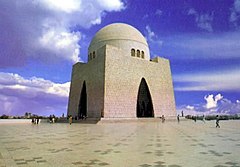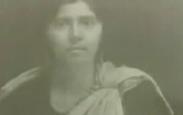Jinnah family
| Jinnah family | |
|---|---|
 Mazar-e-Quaid, the final resting place of Muhammad Ali Jinnah and Fatima Jinnah. | |
| Current region | New York City, USA (Dina Wadia)[1] |
| Place of origin | Kathiawar, Gujarat, India[2] |
| Members | Muhammad Ali Jinnah Fatima Jinnah Emibai Jinnah Maryam Jinnah Dina Wadia |
| Connected families | Wadia family Petit family |
| Distinctions | Political prominence |
| Traditions | Khoja Shia Islam[3] |
| Estate(s) | See Full list |
The Jinnah family (Template:Lang-ur; Template:Lang-gu) was a political family of Pakistan. Jinnahs have played an important role in the Pakistan Movement for creation of Pakistan, a separate country for Muslims of India. The family held the leadership of All-India Muslim League, and it's successor, Muslim League, until it dissolved in 1958 by martial law. Originally from a Gujarati Hindu background, the family converted to Shia Islam in the 19th century and moved to Karachi from Kathiawar, Gujarat.[4]
Muhammad Ali Jinnah (also referred to as only Jinnah) and Fatima Jinnah, have been an important figure in the history of Pakistan. Jinnah was the founder and the first Governor General of Pakistan, while, Fatima played an important role in the struggle for Pakistan Movement and were the founding fathers of Pakistan. Jinnah and Fatima has remained an extremely important and well-respected figures in Pakistan, even after their deaths.[6][7]
The family's only living member is Jinnah's daughter, Dina Wadia (née Jinnah) who married Neville Wadia, an Indian Parsi from Mumbai. Since 2003 Dina lives alone with staff in the New York City, United States, whereas Wadia family lives in Mumbai, India.[1]
Members of the Jinnah family
First generation
- Premjibhai “Meghji” Thakkar, the patriarch of the family is the paternal grandfather of Muhammad Ali Jinnah and Fatima Jinnah. He was a Hindu Lohana from Paneli village in Gondal State in Kathiawar, Gujarat, who converted to Islam.[8][9]
Second generation
- Poonjabhai “Jinno” (also referred to as Jina Poonja[10]), a Lohana (1857–1902), was married to Mithhibai.[8]
- Poonjabhai Thakkar was a prosperous Gujarati merchant. He moved to Karachi from Kathiawar, because of his business partnership with Grams Trading Company whose regional office was set up in Karachi. He moved to Karachi before Muhammad Ali Jinnah's birth. He and his wife had 7 children:
- Muhammad Ali Jinnah
- Ahmed Ali Jinnah
- Bunde Ali Jinnah
- Rahmat Bai Jinnah
- Shireen Jinnah
- Fatima Jinnah
- Maryam Bai Jinnah
Third generation
- Muhammad Ali Jinnah (1876–1948)
- Jinnah is the founder of Pakistan and was the country's first Governor-General. His first marriage in 1892 was the result of his mother urging him to marry his cousin Emibai Jinnah before he left for England to pursue higher studies. However, Emibai died a few months later. His second marriage took place in 1918 to Rattanbai Petit (granddaughter of Dinshaw Maneckji Petit and Ratanji Dadabhoy Tata), a Parsi who was 24 years his junior. Rattanbai converted to Islam when she married Jinnah and took on the name Maryam Jinnah, but continued to be known as Rattanbai.[11] In 1919, she gave birth to their only daughter, Dina Jinnah.[12][13]
- Ahmed Ali Jinnah
- Bunde Ali Jinnah
- Rahmat Bai Jinnah
- Shireen Jinnah
- Fatima Jinnah (1893–1967)
- Fatima Jinnah was a dental surgeon, biographer, stateswoman, and one of the leading Founding mothers of modern-state of Pakistan. She also played a pivotal role in civil rights and introduced the women's rights movement in the Pakistan Movement. After her brother's death she continued to play a pivotal role in Pakistani politics and in 1965 returned to active politics by running against Ayub Khan in the 1965 elections.
- Maryam Bai Jinnah
Fourth generation
- Dina Wadia (b. 1919)
- Dina was born to Muhammad Ali Jinnah and Maryam Jinnah in London shortly after midnight on the morning of August 15, 1919. As Stanley Wolpert's Jinnah of Pakistan records: "Oddly enough, precisely twenty-eight years to the day and hour before the birth of Jinnah's other offspring, Pakistan."[7]
She had a rift with her father when she expressed her desire to marry a Parsi-born Indian, Neville Wadia. According to M C Chagla in "Roses in December", Jinnah, a Muslim, disowned his daughter after trying to dissuade her from marrying Neville. Dina Wadia is the only direct living link to Jinnah and the nation of Pakistan claiming her father as its own father of the nation is assumed to have some kind of kinship with her according to Akbar S. Ahmed.[14] His descendants through her are part of the Wadia family and reside in India as she married and stayed in India after the creation of Pakistan in 1947. Dina Wadia lives alone with staff in the New York City, United States.[1]
Estates
- Wazir Mansion, Jinnah's birthplace in Karachi
- South Court, Muhammad Ali Jinnah's former residence in Mumbai, India, currently owned by the government of India.
- Muhammad Ali Jinnah House, Jinnah's former House at 10 Dr APJ Abdul Kalam Road, New Delhi, currently the Dutch Embassy in India.
- Quaid-e-Azam House, Muhammad Ali Jinnah's House in Karachi
Family photos
See also
References
- ^ a b c Business baron Nusli Wadia attends to his ailing mother
- ^ "Wars and No Peace Over Kashmir".
- ^ Biography of Muhammad Ali Jinnah
- ^ a b Gujrats gifts to India and Pakistan
- ^ The Snake Oil Salesman
- ^ The story of Pakistan
- ^ a b Guriro, Amar (30 June 2009). "Aslam Jinnah's claim of being Quaid's family disputed". Daily Times. Retrieved 11 September 2012.
- ^ a b Closed fist worth millions
- ^ Dr. Babasaheb Ambedkar, Writings and Speeches, Volume 17, Issue 2, Education Department, Government of Maharashtra, 2003, p. 339
- ^ The truth about Aslam Jinnah, Dawn, Liaquat Merchant, (the grandson of Maryam Bai, one of Quaid-e-Azam’s sisters), JUL 10, 2009
- ^ The inscription on her grave at Khoja Isnaashari Cemetery, Mazgaon, Bombay, uses name Rattanbai
- ^ Khalid, Amna (30 December 2011). "Ruttie's love letter to Jinnah". Daily Express. The Express Tribune. Retrieved 11 September 2012.
- ^ Official website, Government of Pakistan. "Early Days: Birth and Schooling". Archived from the original on 2005-11-05. Retrieved 2006-04-20.
- ^ Akbar S. Ahmed. Jinnah, Pakistan and Islamic Identity: The Search for Saladin. p. 18.








